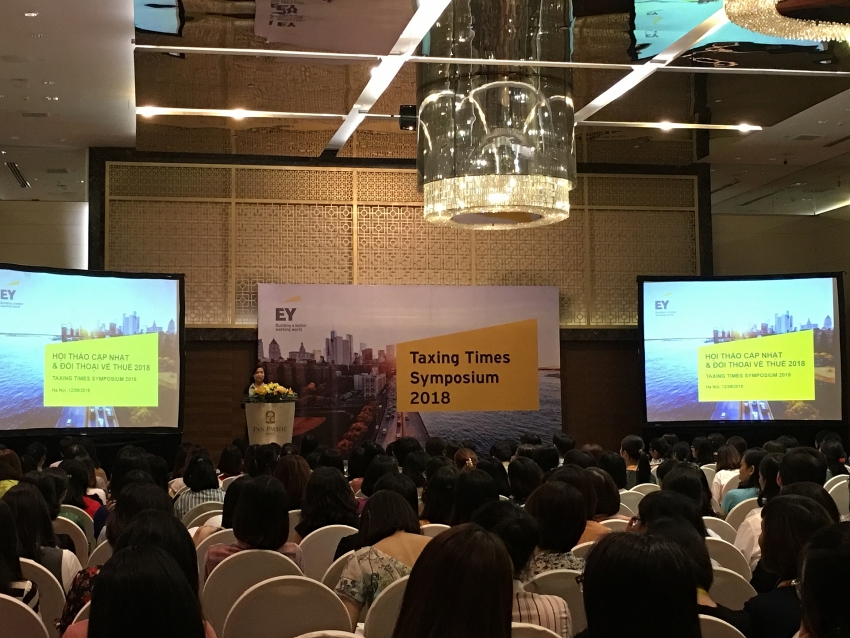Deducting online advertising expenses: a tough nut to crack
Online advertising expenses are posing a tough nut to crack for businesses in Vietnam as they find circulars guiding tax regulations on it vague to make claims for deductibles.
On the side-lines of the Taxing Times Symposium 2018 held by EY Vietnam on September 12, Pham Thi Hue, chief accountant at water purification equipment provider A.O. Smith Vietnam Company Ltd., expressed her concerns that as her company regularly advertises products on Facebook, they may not be able to claim this as an advertising expense due to a lack of supporting documents like contracts signed with Facebook or invoices issued from the social networking service company.
“We are paying up to VND1 billion ($44,247) a month to Facebook for advertisements. To be eligible for a tax deduction, we ought to have an invoice or proof of purchase to back up our claim,” she stressed. “However, Facebook does not issue an invoice or sign a contract for the advertising services that we use.”
Hue further explained that Facebook requests customers to pay for the purchases via credit card and the credit card of a company is often authorised to an employee. As a results, tax authorities may view this as personal expense as the bank statement of the credit card is issued under the name of the employee.
“When a tax audit arises, we are all worried that this cost would not be considered as a corporate expense and thus it would not be eligible for tax deduction when we finalise our corporate income tax (CIT) at the end of the financial year.”
“Circulars to guide taxpayers are not completely clear and businesses like us are having trouble with following the tax authority’s instructions to fulfil our tax obligations,” noted Hue. “We are afraid that we may interpret the tax regulations or guiding circulars incorrectly.”
According to Hue, A.O. Smith Vietnam Company Ltd. has sent enquiries to the Hanoi Tax Department for further guidance on the issue but has yet to receive a response. “The Hanoi Tax Department has forwarded our questions to the General Tax Department and it has been two months that we have not heard anything from them.”
Not only A.O. Smith Vietnam Company Ltd., many others are also making use of Facebook as an effective channel of advertising for their business, and they are more or less facing the same issue: their advertising costs are on the rise, but they may not be entitled for tax deductions.
CIT and value-added tax (VAT) are the tax areas many companies operating in Vietnam are paying particular attention to on the back of the digitalisation age. E-invoice, for now, has emerged as a new form of proof of purchase and thus requires tax authorities to respond in due course to come up with appropriate guidance on its treatment.
With this, for businesses like A.O. Smith Vietnam, a bank statement showing the advertisement payment can serve as a proof of purchase or for e-commerce businesses, an e-invoice can be sufficient in itself.
 |
| Regulations on tax deduction need to be tailored to fit the digital age |
“We are hoping that with the move towards e-invoices, the [VAT] refund procedure will be simplified and the transparency can be improved,” said Robert King, EY partner and tax leader for Vietnam, Laos, and Cambodia.
What the stars mean:
★ Poor ★ ★ Promising ★★★ Good ★★★★ Very good ★★★★★ Exceptional
Related Contents
Latest News
More News
- Foreign leaders extend congratulations to Party General Secretary To Lam (January 25, 2026 | 10:01)
- 14th National Party Congress wraps up with success (January 25, 2026 | 09:49)
- Congratulations from VFF Central Committee's int’l partners to 14th National Party Congress (January 25, 2026 | 09:46)
- 14th Party Central Committee unanimously elects To Lam as General Secretary (January 23, 2026 | 16:22)
- Worldwide congratulations underscore confidence in Vietnam’s 14th Party Congress (January 23, 2026 | 09:02)
- Political parties, organisations, int’l friends send congratulations to 14th National Party Congress (January 22, 2026 | 09:33)
- Press release on second working day of 14th National Party Congress (January 22, 2026 | 09:19)
- 14th National Party Congress: Japanese media highlight Vietnam’s growth targets (January 21, 2026 | 09:46)
- 14th National Party Congress: Driving force for Vietnam to continue renewal, innovation, breakthroughs (January 21, 2026 | 09:42)
- Vietnam remains spiritual support for progressive forces: Colombian party leader (January 21, 2026 | 08:00)

 Tag:
Tag:




















 Mobile Version
Mobile Version